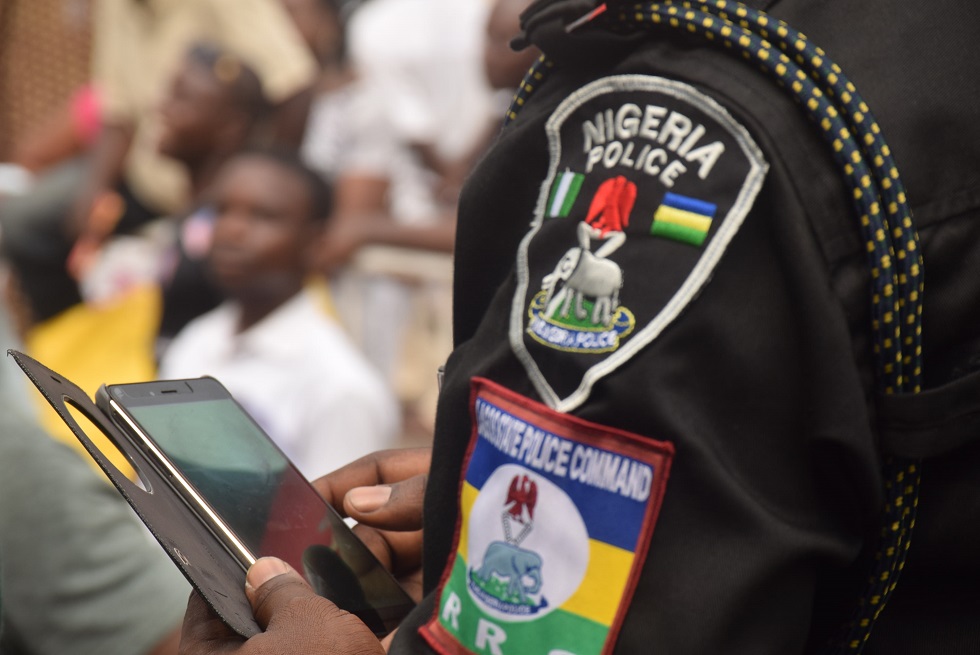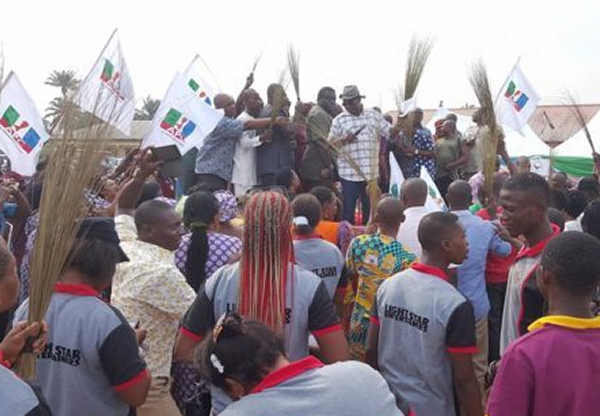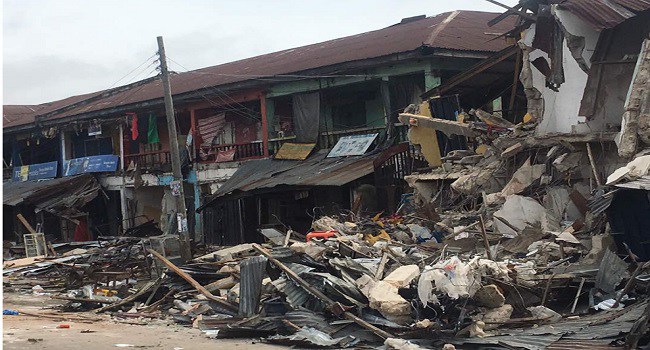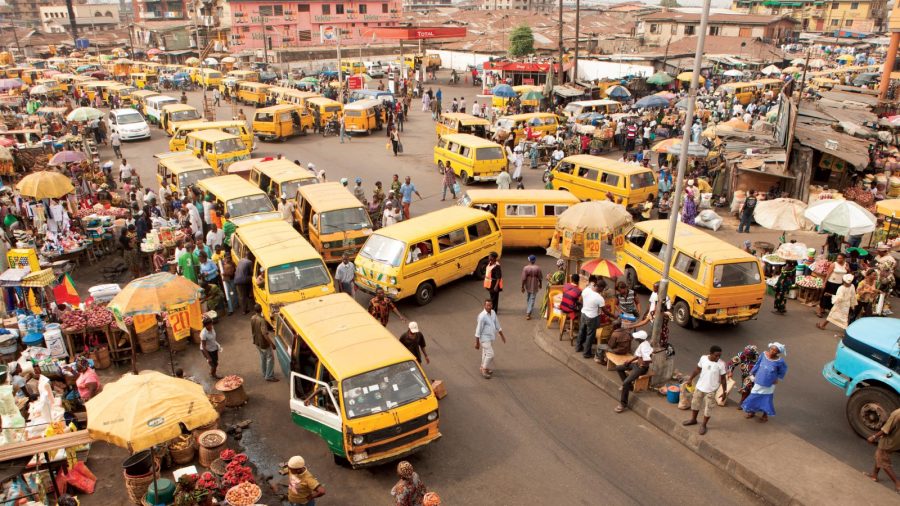BY SOLOMON ELUSOJI
On August 26, some minutes before 23:59, Gado Abimelech, a civil servant with the Benue state government, felt drops of rain hit his roof. It was going to be a cool, refreshing night, he thought. But, around 2:30 on August 27, he received a call from his neighbour. The voice on the other end sounded distressed and was blabbering about “water inside the house”. Curious, he swung his foot off the bed. But instead of feet hitting solid ground, he slipped into a pool of water that stopped at his waist.
“The only thing I could save was my certificates,” Abimelech, who studied economics at Ahmadu Bello University, Zaria, told this reporter at the Ultra Modern International Market in Makurdi on Sunday.
A swarthy, sad man, he wore a simple shirt and pair of trousers over a gleaming black shoe. “I have moved my eight children and wife to a friend’s place, but I am here (the international market) to register for the government’s relief materials.”
Abimelech story is not unique. This reporter spoke to tens of Makurdi residents at the international market, which has become a melting ground for flood victims after the Benue government transformed it into an IDP camp, and they had similar stories of “waking up to find a flooded room with all valuables soaked”.
Advertisement
“What saved me was that there was no electricity,” a Barnadata Quarters resident, Terfa Abwelem, said, “I don’t know what might have happened.”
According to NAN, more than 100,000 people in and around Makurdi have been displaced by the flood.
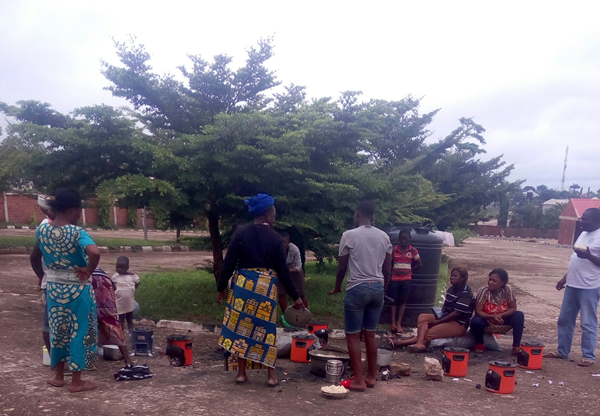
At 8:15 on Sunday morning, this reporter walked through the gates of the international market, where there were makeshift vigilantes checking bags and scrutinising faces.
Advertisement
The international market is a series of shops sitting in perfect rows and columns and built with red bricks. The compound is commodious, with far-flung fences, and the grounds are cemented. From the entrance, the landscape slopes downwards.
There were no National Emergency Management Agency (NEMA) officials or their state counterparts on the ground at the time. But children, most with little or no clothing, scuttled around the compound, playing games; their mothers sat, some in groups, in front of the shops which had become their temporary abode. There were few men in view; a handful was seated in front of a single building to the east, facing the main complex.
Beside a huge water tank was another building removed from the main complex. Inside was a woman, wearing dreadlocks, sitting on a stack of rice-bags and a fair, sweeping the floor. The room itself was filled with supplies: some stoves, bag of charcoals, a pile of old clothes, bags of satchel water.
The dreadlocked woman was Irene Awunah-Ikyegh, the convener of the Vanguard against Tiv Massacres (VATIM), a non-profit organisation consisting of young Benue professionals. Besides her dreadlocks, she was sporting a white, heavily-inscribed shirt, blue jeans and grey sneakers. Sitting on the rice-bags, she looked heavy, powerful, but her eyes were tired.
Advertisement
“I left here around 22:00 yesterday,” she said, wryly.
Awunah-Ikyegh, who is based in Abuja, travelled to Makurdi August 30, to assist the Makurdi flood victims. She is working under a coalition of non-profit, Benue Non-Governmental Organisation Network (BENGONET).
When the flood started on August 27, Awunah-Ikyegh told this reporter, some BENGONET members were mobilised to help evacuate trapped residents. There was no government response until August 29, when the Benue State Emergency Management Agency (BSEMA), announced the international market as an IDP camp.
Even then, there was no provision of any sort for those who filtered into the camp.
Advertisement
“When I arrived here on Wednesday, I was very devastated,” Awunah-Ikyegh said. “There was simply no presence of government.”
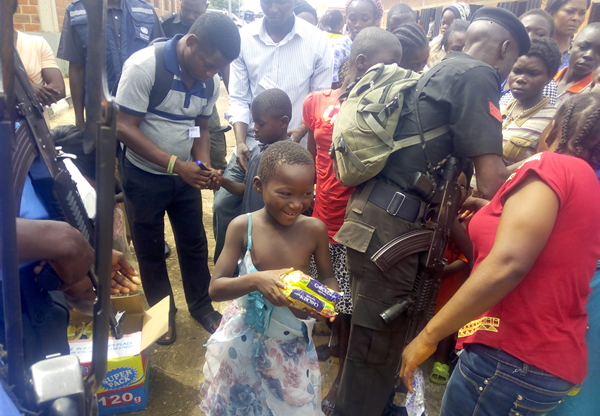
Government’s presence only started to be felt on September 1, when the director general of NEMA, Mustapha Maihaja, visited the camp and some affected communities. He announced the delivery of seven trucks (of supplies) from Abuja to Makurdi; three of those trucks arrived on September 2.
Advertisement
“It was only on Saturday that the people started to feel the presence of a government relief agency.”
On Saturday evening, each household inside the camp was given a quarter bag of uncooked rice and water was transported into the camp’s huge tank. But, as of 9:00 Sunday, there was no water for sanitation in the camp. The borehole was bad and there was no power supply.
Advertisement
As of the time of filing this report, the camp had no mattresses – most of the children sleep on the floor. Also, there are no mosquito nets, no condiments and energy for cooking the bags of rice shared on Saturday. This reporter was at a scene where a group of families pooled resources to prepare their Saturday rice with one of the few charcoal stoves available. The result was a white, pasty cereal. It was ladled on plates and red powdered pepper was sprinkled on top. “It actually tastes very good,” one of the men said.
As noon gingerly approached, on Sunday, the international market was bubbling: some BSEMA and NEMA officials, Red Cross officials and representatives from United Nations agencies, UNICEF and UNHCR, had arrived. A UNICEF chief of field office, Ibrahim Conteh, described the camp situation as “appalling”, but said he was happy to see the government “taking strong steps” and non-governmental organisations showing a lot of “goodwill support”.
Advertisement
“We have not seen any case of malnourishment and the people seem happy,” he said. But he re-echoed the need for better medical facilities, electricity, mosquito nets and mattresses.
“UNICEF has already provided 10,000 aquatabs to treat water in the camp and UNHCR is already in the process of providing sleeping mats.”
While Conteh spoke, a unit of the Nigeria air-force drove into the camp and set up a medical outpost programme on the ground.
At 11:18, some kids had queued at the lower end of the market, under what looked like a mini garage. They were being served a cup of pap and a wrap of moi-moi for breakfast. The food was provided by Gidan Bege Orphanage, which is run in Benue by David and Deborah Audu, a couple.
“Last night, I had sleepless nights knowing the conditions of these kids,” Deborah Audu said. Through their orphanage, they have committed to providing breakfast to as many camp kids as possible.
“We are only doing the little we can; if everyone can do just a little, there will be a lot of relief for the victims, especially for the women and children.” The couple make it a priority to serve kids first, then pregnant and nursing women.
This reporter spent Sunday afternoon patrolling downtown Makurdi, at Idye Village, one of the hardest hit communities.
Idye is a community of low-roof houses that smelt, awfully, of soaked things. The streets were not deserted; music streamed out of room windows, a woman was grinding pepper at the front of her house, a man busied himself with displaying his charcoal wares, and restaurants, made of decrepit shacks, served watery egusi and leathery fufu.
The marks of the water level can still be seen on the buildings, some wet above the window level. There were collapsed huts and buildings that had become parallelograms. But the impact of the tragedy can hardly be spotted on the faces of the people. It was like nothing had happened.
“We had never seen water like that before,” a man told this reporter at a fufu joint, but refused to say no more, simply shrugging away further probing as he waited for his meal.
Although some houses, those close to the canal-like body of water that borders a part of the community, were still surrounded by water as at 14:00 on Sunday, this reporter spotted people in them.
This resolve to stay put in water-ridden areas, despite the apparent health and security implications, is driven less by nostalgia for home than for a distrust of government. When some BENGONET officials went to some of the affected communities to record their data, they refused to cooperate.
“That’s how you people do,” they said. “We do not expect anything to come out of it.”

The motorcycle driver who ferried this reporter to the international market Sunday morning was also sceptical. “Most people won’t bother to go to the IDP camps,” he said, “because they know the supplies will be diverted; that’s how we behave here.”
This driver, who gave his name as Sani, is Hausa, but he was born and raised in Makurdi and calls it home.
Awunah-Ikyegh told this reporter that the civil societies will never let such a thing – diverting supplies – happen this time.
“We will be monitoring the situation,” she said.
But, probably more urgent than the problem of diversification, is the problem of supplies reaching those actually affected. Although Benue is referred to as the food basket of the nation (the state is a major producer of several edible and cash crops), most of its agriculture is subsistence, curtailing its high potentials and cultivating a poor population.
There have been reports of people whose houses were not flooded registering at the IDP camps; just to have a chance to put food on the table. To address this issue of systemic theft, the camp officials at international market announced, on Sunday, that registration at the campsite had been halted; residents were now expected to return to their flooded homes and wait for officials to visit and collect their data. The idea is preposterous.
“I can’t even access my house,” Abwelem, the Barnadata Quarters resident told this reporter. Gwa Obadiah, who lived in a community called Ghana before the flood, said there was no way he could return with his wife and four children.
And, considering the slow-paced nature of this government (it took an emergency agency six days to respond with food), how many days (and people) will it take to complete this planned data collection? True, the NGOs have signalled their readiness to join forces, but success, from the look of things, still lies in the realm of miracles.
One way to understand the Benue government’s narrative for the cause of flooding is that it is an act of God. “As a government, we feel that this shouldn’t have happened but it has happened,” Terver Akase, chief press secretary to Samuel Ortom of Benue state governor, told Channels Television last week.
“It is a natural disaster . . . water is beyond human control; it must come whether we like it or not. It is natural disaster in the sense that, it is rain. We can’t prevent rain from coming.”
Vincent Tsea, special adviser to the governor on state emergencies, also told this reporter that the flooding was an unexpected disaster.
“We were preparing for September,” he said. “We didn’t know it would come in August.”
But the arguments are unfortunate. Flooding in Benue, especially Makurdi, is not novel. Between September and October 2012, flooding displaced over 700,000 persons in the state, with thousands of farmlands, houses and huts either submerged or washed away.
In response to the flooding, the government created camps for the displaced in Makurdi metropolis where those who were rendered homeless by the devastation went to seek shelter. Primary schools within Makurdi were closed and turned into camps where the displaced persons lived and survived on goodwill donations from charity organisations, religious bodies, non-governmental (NGOs), donor agencies, governmental agencies and public-spirited individuals.
Then, everyone went to sleep.
Now, it is happening all over again and the government is asking for billions to dredge the River Benue and construct drainages.
Yesterday, as the afternoon lengthened, the skies threatened. People looked up to the skies and shook their heads, knowing that when it pours, no one is safe.
Add a comment
